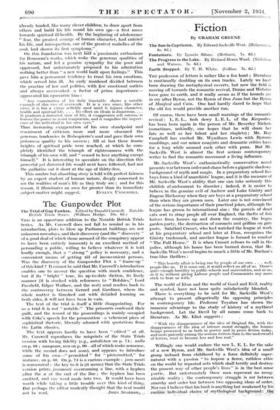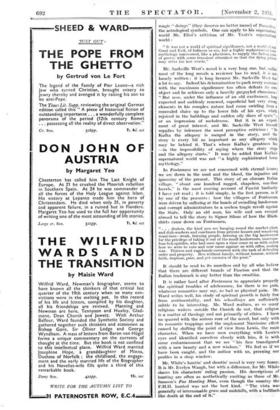Fiction
By GRAHAM GREENE
Fontattiara. By Ignazio Silone. (Methuen: 7s. 6d.)
Earth Stopped. By T. H. White. (Collins. 7s. tkl.) Tim profession of letters is rather like a fox hunt ; literature is ,continually doubling on its own tracks. Lately we have been drawing the metaphysical coverts, but now the field is moving off towards the romantic revival, Donne and Webster have gone to earth, and it really seems as if the hounds are in ery after Byron, not the Byron of Don Juan but the Byron of Manfred and Cain. One had hardly dared to hope that the old fox would provide another run.
Of course, there have been small warnings of the romantic revival : L. E. L., lush dewy L. E. L. of the . Keepsakes, has been born again in the person of Mr. Beverley Nichols (sometimes, unkindly, one hopes that he will share her fate as well as her talent and her . ringlets) ; Mr. Roy Campbell has excited Mr. Wyndham Lewis. with Byronic rumblings, and our minor essayists and dramatic critics have for a long while amused each other with puns. But Mr. Sackville West is almost the first serious contemporary writer to find the romantic movement a living influence.
Mr. Sackville West's enthusiastically conservative novel presents war between -order and chaos before a gigantic shadowy background of myth and magic. In a preparatory school five boys form a kind of anarchists' league, and it is the measure of Mr. Sackville West's ability that one can take seriously this childish abandonment to disorder ; indeed, it is easier to believe in the genuine evil of Andrew and Luke Ginisty and Eugene Hathaway when they are boys at a preparatory school than when they are grown men. Later one is not convinced of the serious importance of their practical jokes, although the league has grown to international size : the parcels of dead cats sent to stray people all over England, the thefts of fish knives from houses up and down the country, the bogus garden-party, the destruction of coronets and griffins on gate posts. • Salathiel Cresset, who had watched the league at work at his preparatory school and later at Eton, recognizes the Ginisty trademark, and another league is formed to combat " The Full House." It is when Cresset refuses to call in the police, although his house has been burned down, that Mr. Sackville West's novel begins to smack 'a little of Mr. Buchan's true-blue thrillers : " This beastly affair is being run by people of our own . . • well, people like us. If it came out, it would reflect on all of us. There's quite enough hostility to public schools and universities, and so on, as it is; without giving Labour people and Communists any more stick to beat us with.'
The world of Eton and the world of Good and Evil, reality and symbol, have not been quite satisfactorily blended.
There is everything to be said for Mr. Sackville West's attempt to present allegorically the opposing principles in contemporary life. Professor Toynbee has shown the immense advantage to the study of history of a mythical. background. Let the Devil by all means come back to literature. As Mr. Eliot suggests :
" With the disappearance of the idea of Original Sin, with the disappearance of the idea of intense moral struggle, the human• beings 'presented to us both in poetry and in prose fiction today. and more patently among the serious writers than in the underworld of letters, tend to become less and less real."
Willingly one would endure the new L. E. L. for the sake of a new Byron, and Mr. Sackville West's idea of a small group imbued from childhood by a force definitely super- natural with a passion " to impose a fierce, ruthless ethic on the world by repeated acts which shall terrify and destroy. the present way of other people's lives" is in the best sense. poetic. But unfortunately these men . represent no recog-_ nimble reality ; the contemporary struggle is, not between, anarchy and order but between two opposing ideas of order., Nor can I believe that his book is anything but weakened by hisl, ..curcoTnal"indiNidual • choice: of mythological background magic " doings" (they deserve no better name) of Paraceinn, the astrological synibols. One can apply to his supernatural world Mr. Eliot's criticism of Mr. Yeats's supernatural world : " It was not a world of spiritual significance, not a world of red Good and Evil, of holiness or sin, but a highly sophisticated lover mythology summoned, like a physician, to supply the fading pulse of poetry with some transient stimulant so that the dying patient may utter his last words."
Mr. Sackville West's novel is a very long one, but, ankle most of the long novels a reviewer has to read, it is not loosely written : it is long because Mr. Sackville West has a lot to say. Indeed his determination to pack every sentence with the maximum significance too often defeats its own object and he achieves only a heavily gargoyled clumsiness: " But now, under the influence of an old excitement, long expected and suddenly renewed, superficial but very strong elements in his complex nature had come swirling from a concealed sluice up to the lower lids of his eyes, which rejoiced in the bubblings and sudden oily discs of spate "; or an impression of melodrama. But it is an experi- ment of great interest, and Mr. Sackville West himself supplies by inference the most perceptive criticism : "In Kafka the allegory is merged in the story, and the story is every bit as important as any allegory which may be behind it. That's where Kafka's greatness lies —in the impossibility of saying where the story stops and the allegory starts." It may be added that Kafka's supernatural world was not " a highly sophisticated lower mythology."
In Fontamara we are not concerned with eternal issues; we are down in the mud and the blood, the injustice and ignominy of the present. This story of an obscure Italian village, " about one hundred ragged, shapeless, one-floor hovels," is the most moving account of Fascist barbarity I have yet read ; it is told simply, in the first person, as if by one of the peasants : how the villagers of Fontamara were driven by suffering at the hands of swindling landowners and corrupt administrators to a useless tragic revolt against the State. Only an old man, his wife and son escaped abroad to tell the story to Signor Silone of how the Black- shirts came down on Fontamara, " . . . dealers, the kind you see hanging round the market-place, and dish-washers and coachmen from private houses and wandering musicians—weak, fawning _people, fawning on the big landowners for the privilege of taking it out of the small landowners, unscrupu- lous lick-spittles, who had once upon a time come to us with orders how we were to vote and now came against us with rifles, making war. Thieves and vagabonds entrusted with the task of defending order and property. Men without family, without honour, without faith, impious, poor, and yet enemies of the poor."
It should be read to its merciless end by all who believe that there are different brands of Fascism and that the Italian trademark is any better than the swastika.
It is rather hard after Fontamara to appreciate properly the spiritual troubles of adolescence, for there is no pain. whatever romantics may say, as bad as physical pain. Mr. Ward writes well, his study of spiritual growth is fairly free from sentimentality, and his schoolboys are sufficiently subtle to be interesting. Mr. Ward realizes, as so many religious writers outside the Church do not, that religion is a matter of theology and not primarily of ethics. I have no quarrel with the serious core of the novel, but only with its romantic trappings and the unpleasant Narcissine effect caused by shifting the point of view from Lewis, the main character. When we have seen everything with Lewis's eyes and identified ourselves closely with him, it is with some embarrassment that we see " his face transfigured with a new beauty and a new wisdom." We feel as if we have been caught, and the author with us, preening our profiles in a shop window.
Mr. White's huntin' and shootin' novel is very very funny. It is Mr. Evelyn Waugh, but with a difference, for Mr. White shares his characters' ruling passion. His descriptions of hunting are often as aesthetically exciting as those of Mr. Sassoon's Pox Hunting Man, even though the country • the F.H.H. hunted was not the best kind. " The vista was generally of interminable grass and molehills, with a bullfinch like death at the end of it."















































 Previous page
Previous page